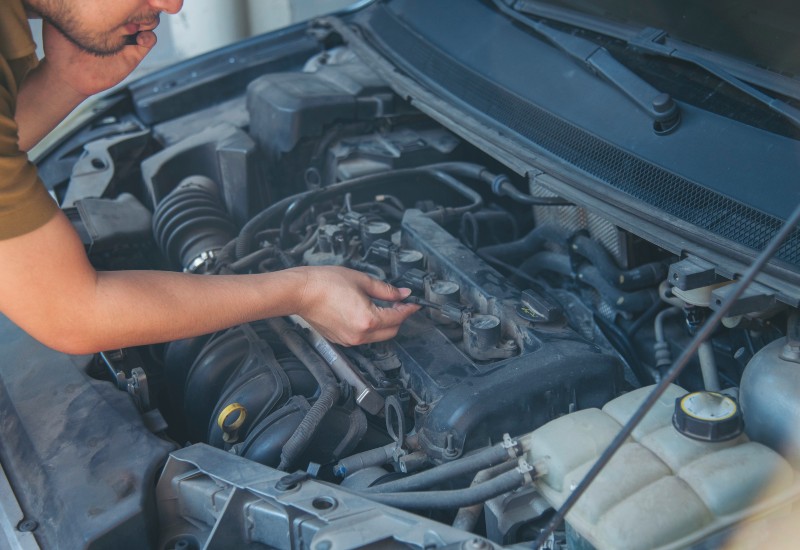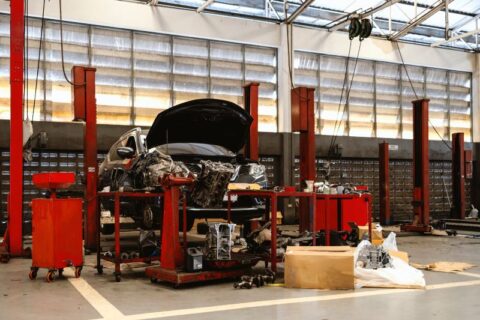BMW Engine Overheating: Symptoms, Causes & Repair

Symptoms, Causes, and Repair for BMW Engine Overheating
Your engine overheats when its temperature rises to a level that is greater than its normal operating range. Ignoring the warning signs of an overheated engine can increase the risk of major engine damage, reduced performance, and potential engine failure. If you own a luxury vehicle like a BMW, it’s very important to understand what causes engine overheating and how to prevent it. Here is your guide to understanding the symptoms, causes, and repair options for BMW engine overheating problems.
Recognizing Signs of an Overheated Engine
Some of the factors that can contribute to your risk of an overheated engine are using the wrong type of coolant, neglecting routine maintenance, coolant leaks, clogged coolant systems, and water pump failure. Recognizing the early warning signs of an overheated engine can ensure you get expert repair quickly enough that you don’t risk engine failure:
- A rapidly increasing temperature gauge or a temperature gauge reading that is higher than normal
- Steam or smoke coming from under your hood, especially when your engine is running
- Strange noises coming from your engine, like knocking, hissing, thumping, or tapping
- A sudden loss of engine power
- Rough idling or stalling
- A burning odor that smells like burnt coolant or burning rubber
- The check engine light or temperature warning lights are illuminated
- Puddles under the car or signs of a coolant leak
Why Is My Engine Overheating?
No one wants to deal with engine problems, but problems with the engine of a performance vehicle like a BMW are particularly upsetting. Understanding the most common causes of engine overheating in BMWs can help you reduce your risk of issues:
- Coolant Leaks – One of the most common causes of an overheating engine in a BMW is a coolant leak. This can be caused by damaged, old, or leaky hose or radiator issues. Water pump damage can also cause drops in coolant levels, which can lead to poor engine cooling.
- Water Pump Failure – The water pump is responsible for circulating coolant throughout the engine. If it is old or damaged, the coolant will not circulate properly, and the engine may overheat.
- Clogged Cooling System – Clogs in the radiator, thermostat, or other elements of the cooling system can also prevent proper flow of coolant throughout your engine. This will prevent the engine from properly absorbing and dissipating heat, leading to the engine overheating.
- Faulty Thermostat – A faulty thermostat may cause the engine to heat too quickly before triggering cool-down responses. A thermostat that is stuck can also prevent coolants from circulating properly.
- Radiator Fan Problems – The radiator fan is responsible for keeping the coolant cool as it passes through the radiator. When the fan isn’t working properly, the coolant won’t cool down as quickly.
- Using the Wrong Type of Coolant – If you use the wrong type of coolant for your BMW, it may not contain the properties needed to protect your vehicle’s engine.
Protecting Your BMW From an Overheating Engine
There are many things you can do to protect your BMW from an overheating engine. Taking these steps will also extend the lifespan of your vehicle and reduce your risk of other problems:
- Regularly check the coolant levels and replace the coolant when needed.
- Make sure the coolant level is always between the minimum and maximum markings on the reservoir when the engine is cold.
- Use the coolant recommended in your owner’s manual.
- Do not ever mix different types of coolant.
- Do not ever mix coolant with tap water.
- Regularly inspect the cooling system.
- Check belts, hoses, and the radiator and expansion tank for signs of wear and tear, leaks, or damage.
- Replace faulty pressure caps right away.
- Properly maintain the radiator and radiator fan.
- Flush the radiator when needed.
- Replace the radiator if it is corroded or cracked.
- Bring your vehicle to a service center if you notice corrosion or scaling in the radiator’s water jacket.
- Regularly inspect and test the thermostat and water pump and replace them as recommended by your owner’s manual.
- Never ignore a temperature gauge that is in the red zone.
- Never ignore the check engine light or temperature warning light.
What to Do if Your BMW’s Engine Is Overheating
You should know what to do if your BMW’s engine is overheating so that you can protect yourself and your passengers as well as your vehicle. These are the most important steps to take if your engine is overheating:
- Immediately pull over to a safe location.
- Turn off the vehicle’s engine or turn the heater on full blast with the windows down to dissipate heat from the engine.
- Let the engine cool down for at least 30 minutes before opening the hood, checking fluids, or attempting repairs.
- Do not drive the car before you know what the problem is.
- Check the coolant levels in the overflow tank and radiator.
- If the coolant is low, add a 50-50 mix of coolant and distilled water.
- Look for signs of coolant leaks or damage to the hose, radiator, and water pump.
- If adding coolant doesn’t solve the problem, or if you can’t determine why your engine is overheating, bring your vehicle to a certified BMW repair facility to avoid premature engine failure, a vehicle fire, or total loss of your vehicle.
Call Now for BMW Engine Overheating Repair
At Boyd Motor Werks, we can diagnose BMW radiator and coolant system issues quickly. We have more than 40 years of experience in the industry, and our team of auto technicians includes BMW specialists and Master Technicians. We offer pre- and post-purchase BMW inspections as well as engine light repair, warning light diagnostics, and radiator repair and replacement.
Our comprehensive services are designed to protect vehicle safety, enhance performance and lifespan, and maintain the value and beauty of your luxury vehicle. We offer BMW repair, preventive maintenance, routine care, inspections, diagnostics, and OEM replacement parts. Call us now or contact us online to make an appointment at our BMW service center for engine overheating repair in Portland, OR.


